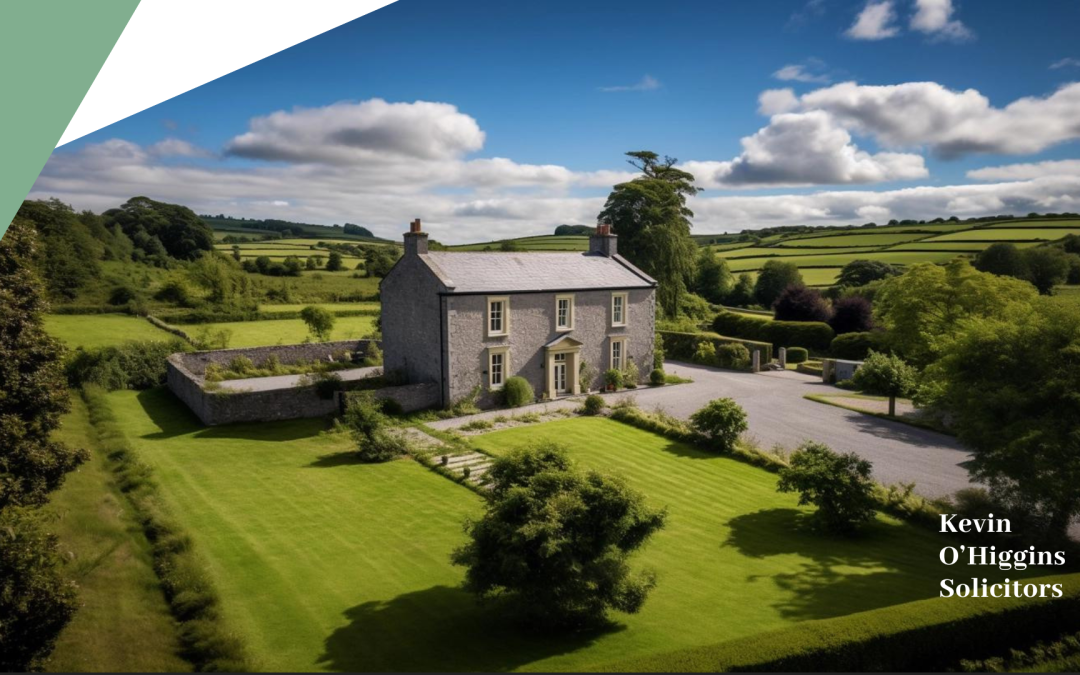
Buying Property in Ireland (2024 Guide) + FREE 10-Step Checklist
Introduction
As we step into 2024, the landscape of buying property in Ireland continues to evolve, presenting both exciting opportunities and unique challenges. The Irish property market remains open and inviting to everyone – Irish citizens, EU/EEA nationals, non-EEA nationals, and even those not residing in Ireland.
Remember: Owning property in Ireland does not automatically grant residency rights.
Whether you’re a first-time buyer, looking to upgrade, or an investor seeking to expand your portfolio, understanding the nuances of the Irish property market is crucial.
In this comprehensive guide, we delve into the key aspects of purchasing property in Ireland, from initial budgeting and financial planning to navigating the complexities of legal processes. We aim to equip you with the knowledge and confidence needed to make informed decisions in this dynamic market.
Buying a home is more than just a financial transaction; it’s a journey into a new chapter of life. With the right preparation and understanding, this journey can be both rewarding and exhilarating. Let’s embark on this adventure together & explore the essential steps to successfully buying property in Ireland.

Preparing for Your Property Purchase
Determining Your Budget and Financial Planning
The first (and most critical) step in your property-buying journey is to establish a clear financial plan. This involves not only determining your budget for the purchase price but also accounting for all associated costs. These costs include mortgage fees, solicitor’s fees, insurance, and any potential renovation or decoration expenses. For guidance on tax liabilities when buying and selling property, read our latest Property Tax Playbook.
Begin by assessing your savings, potential mortgage amount, and any additional financial resources you have. It’s crucial to be aware of the Central Bank of Ireland’s mortgage lending rules. Typically, you’ll need a deposit of at least 10% of the property’s value.
Utilising tools like budget planners can help you understand your capacity for monthly mortgage repayments. Securing a mortgage pre-approval early in the process is wise. It clarifies your budget and strengthens your position as a buyer.
Initiating the Property Search
With a budget in hand, embark on the exciting journey of searching for your ideal property. The Irish property market in 2024 offers diverse options, from bustling city apartments to serene countryside homes. Consider factors like location, size, amenities, and potential for future value appreciation. Use various resources such as online property portals, real estate agents, and local networks to find suitable properties.
Additionally, consult the Residential Property Price Register for insights on past property prices in your area of interest. Paying attention to the Building Energy Rating (BER) and checking the Radon Risk Map are also essential steps to ensure the property meets energy efficiency and environmental safety standards.

Surveying and Evaluating Your Property
The Importance of Professional Property Evaluation
Once you’ve found a property that captures your interest, the next crucial step is to have it professionally evaluated. This is particularly important in 2024, as the Irish property market continues to evolve with new building standards and regulations.
A professional evaluation not only uncovers any hidden issues, such as structural problems, dampness, or outdated electrical systems but also informs you about aspects that the seller is not obligated to disclose. This comprehensive understanding of the property’s condition is essential.
Hiring a qualified surveyor can provide you with a detailed report on the condition of the property. Such a survey helps highlight issues you may not have been aware of when you made your offer.
For example, if your surveyor finds that the roof needs to be replaced, you can change your offer to account for this or decide not to buy. This information is invaluable, not only for peace of mind but also as a potential negotiation tool. If significant issues are uncovered, you can use this information to renegotiate the price or request repairs before finalising the purchase.
Navigating the Evaluation Process
When arranging for a property evaluation, ensure that you choose a surveyor with a strong reputation and relevant experience in Irish property, as recommended by professional bodies like the Society of Chartered Surveyors Ireland (SCSI). They should be able to provide a comprehensive assessment covering all aspects of the property, from the foundation to the roof.
Remember, the cost of this evaluation is a smart investment in your future home. It can save you from unexpected expenses and complications down the line. Once you have the evaluation report, review it thoroughly and discuss any concerns with your solicitor or real estate agent.

Understanding the Legal Process: Sale Agreed vs. Legal Sale
Navigating from 'Sale Agreed' to a Legally Binding Sale
In the Irish property market, reaching a ‘Sale Agreed’ status is a significant milestone, but understanding its true meaning is crucial. ‘Sale Agreed’ indicates that the seller has accepted your offer, but at this stage, it’s not legally binding. It represents an agreement in principle, with both parties still able to back out without any legal consequences.
The transition from ‘Sale Agreed’ to a legally binding sale happens when both parties sign the contract for sale. This critical step formalises the agreed terms, including the sale price and any conditions, in a legal document. Once this contract is signed by both you and the seller, it becomes legally binding, committing both parties to the transaction.
The Role of Your Solicitor When Buying Property
At this stage, the expertise of your conveyancing solicitor is invaluable. They play a key role in guiding you through the contract, ensuring that you fully understand all its terms and conditions. Your solicitor will also perform thorough checks on the property, including title verification and confirming that there are no outstanding legal issues that could impact your purchase.
Struggling to find the perfect property solicitor for your transaction? Read our 2024 guide on Finding the Right Property Solicitor (Without Breaking the Bank).
It’s essential to approach this phase without haste. Take time to address any queries or concerns before legally committing to the contract. Once signed, this contract marks your journey towards legal ownership of the property, paving the way for the final steps in your property purchase.

Navigating Title Situations in Irish Property Law
Understanding Different Types of Property Titles
When buying property in Ireland, it’s crucial to comprehend the concept of ‘title’ – the legal right to own, use, and dispose of property. There are mainly two types of property titles in Ireland: Freehold and Leasehold. A Freehold title means you own the property and the land it stands on outright. In contrast, a Leasehold title typically implies ownership of the property for a set period, often in cases of apartments or leasehold houses with long leases.
Your solicitor plays a vital role in verifying the title of the property. They ensure that the seller has the legal right to sell the property and that there are no restrictions, debts, or other rights against it. This verification process is essential for understanding who really owns the property and whether there are any outstanding debts or encumbrances on it.
The Solicitor’s Role in Title Verification
Title verification is a critical part of the property-buying process. Your solicitor will thoroughly examine the deeds to the property, confirming that everything is in order. They will check for any liens, charges, or encumbrances that might affect your ownership rights.
For Leasehold properties, your solicitor will review the lease terms to ensure they are favourable and that the lease duration is sufficient. For Freehold properties, they will verify that there are no issues that could impact your full ownership rights. Understanding the title situation is not merely a legal formality; it’s about securing your investment and your future in the property. This step is essential to ensure that you face no unexpected legal challenges after your purchase.

The Critical Role of Planning Permission
Ensuring Compliance with Local Planning Laws
In Ireland, planning permission plays a pivotal role in property ownership, especially when considering any alterations or extensions to the property. It’s crucial to verify that any previous modifications to the property had proper planning permission, as this step is about safeguarding your investment and avoiding future legal complications, not just fulfilling a bureaucratic requirement.
Your conveyancing solicitor will be instrumental in this process. They will check for any planning permissions associated with the property, ensuring that extensions, conversions, or significant alterations have been legally carried out and approved by the local authorities. This includes checking for things like unauthorised additional buildings, extensions, or attic conversions.
Potential Issues and Their Impact
The absence of proper planning permission can lead to severe complications. It could affect your ability to sell the property in the future and might even require you to reverse unauthorised alterations at your own expense. This is particularly critical for properties that have undergone significant changes or expansions.
Moreover, if you have plans for future renovations or expansions, understanding the local planning regulations is essential. It helps assess the feasibility of your plans and ensures that any developments you undertake will adhere to local building codes and regulations, guaranteeing safety and compliance.
By ensuring the planning permission is in order, you protect yourself from potential legal and financial issues down the line. This is not just a legal formality but a crucial step in securing your investment and your future in the property.

The Contract for Sale: Your 3-Step Guide
Understanding the Contract for Sale
The contract for sale is a crucial document in the property-buying process in Ireland, legally binding both the buyer and the seller to the terms of the sale. This document comprehensively outlines the specifics of the sale, including the agreed-upon price, property description, any included fittings or contents, and any special conditions.
Reviewing and understanding every aspect of this contract is vital. Your solicitor plays a critical role in this process, helping you navigate legal jargon and ensuring your interests are protected. They will scrutinise the contract for any unusual or burdensome clauses that could impact your ownership or usage rights of the property.
Key Considerations Before Signing
Before signing the contract for sale, ensure that:
- All your queries and concerns about the property are addressed.
- You fully understand your legal obligations and rights as detailed in the contract.
- Conditions of sale, such as repairs or modifications by the seller, are explicitly stated.
- The completion date and property handover terms are clear and agreed upon.
Once you sign the contract and pay the deposit, you become legally committed to the purchase. Breaching the contract at this stage can lead to serious legal and financial consequences.
The Role of Your Solicitor in Finalising the Sale
Your solicitor will collaborate with the seller’s solicitor to finalise the contract. They ensure all necessary steps are taken, including securing your mortgage funds and preparing for the property transfer. This coordination is critical for a smooth transition and completion of the sale.
Finalising the contract for sale signifies the final stages of your property-buying journey, leading to the moment when you take ownership of your new home in Ireland.

Dealing with Bridging Funds and Financial Transitions
Understanding Bridging Funds in 2024
The dynamics around bridging loans, traditionally used to cover the financial gap between buying a new property and selling an existing one, have significantly evolved in Ireland as of 2024. It’s vital for buyers, particularly those engaged in simultaneous buying and selling, to understand the current state of these financial tools.
The availability and conditions of bridging loans can vary, influenced by market conditions and lending policies, making consultation with financial advisors or mortgage brokers crucial.
Managing Simultaneous Sale and Purchase
Navigating the simultaneous sale of one property and the purchase of another can be complex and demanding. Key considerations in this process include:
- Planning Your Finances: A clear understanding of your financial situation is crucial, especially considering the equity in your current home and the funds needed for the new purchase.
- Coordinating Timelines: Working closely with your real estate agent and solicitor is vital to synchronise the timelines of both transactions as efficiently as possible.
- Considering Temporary Housing: If there is a gap between the sale and purchase completion dates, arranging temporary housing might be necessary.
Preparing for Financial Transitions
Transitioning from one property to another requires careful financial planning. This includes considering various costs like stamp duty, solicitor fees, moving expenses, and potential immediate renovations or furnishings for your new home.
A detailed financial plan and a contingency budget are instrumental in managing these expenses. Your financial advisor or solicitor will play a crucial role in preparing this plan, ensuring you are financially equipped for every step of your property-buying journey.

Conclusion
Your Path to Buying Property in Ireland
In conclusion, it’s evident that the 2024 property-buying process in Ireland, while intricate, is immensely rewarding. From initial financial assessments and detailed property evaluations to understanding the intricacies of legal documentation and keeping abreast of the latest market conditions, each stage plays a pivotal role in securing your dream home or investment.
Purchasing property is not just a financial endeavour; it represents a significant life milestone. Whether you’re stepping onto the property ladder for the first time, seeking an upgrade, or diversifying your investment portfolio, the essence lies in careful planning, informed decision-making, and seeking appropriate guidance.
It’s important to remember that this guide serves as a roadmap; individual experiences may vary. The assistance of experienced professionals – conveyancing solicitors, financial advisors, and estate agents – cannot be overstated. Their expertise will provide bespoke solutions and insights, making your property acquisition journey as smooth as possible.
At Kevin O’Higgins Solicitors, we work alongside industry experts to help you avoid potential challenges during your property transaction. If you’re looking for more guidance on buying property in Ireland, follow us on LinkedIn and contact Kevin today.

Buying Property in Ireland: Your 10-Step Guide (2024)
1 – Establish Your Budget
- Include mortgage, fees, insurance, and additional costs.
- Use budget planning tools to understand your financial capacity.
2 – Secure Mortgage Pre-Approval
- Clarify your budget and strengthen your position as a buyer.
3 – Select a Conveyancing Solicitor
- Choose a solicitor with experience in property law to guide you through legal processes.
4 – Search for the Right Property
- Consider location, size, amenities, and future value.
- Utilise online portals and check the Residential Property Price Register.
5 – Arrange a Property Evaluation
- Identify potential issues not disclosed by the seller.
- Consider the Building Energy Rating (BER) and Radon Risk Map.
6 – Understand ‘Sale Agreed’ vs. Legal Sale
- Know the difference and the implications of each stage in the buying process.
7 – Check Property Title and Ownership
- Ensure there are no legal issues or encumbrances with the property.
8 – Verify Planning Permission Compliance
- Ensure all modifications and extensions are legally compliant with local planning laws.
9 – Review and Sign the Contract for Sale
- Understand all terms and conditions before committing.
- Ensure any special conditions are clearly stated.
10 – Plan for Financial Transitions and Bridging Funds
- Manage the sale of your current property and the purchase of the new one.
- Consider temporary housing if necessary and coordinate timelines.
























